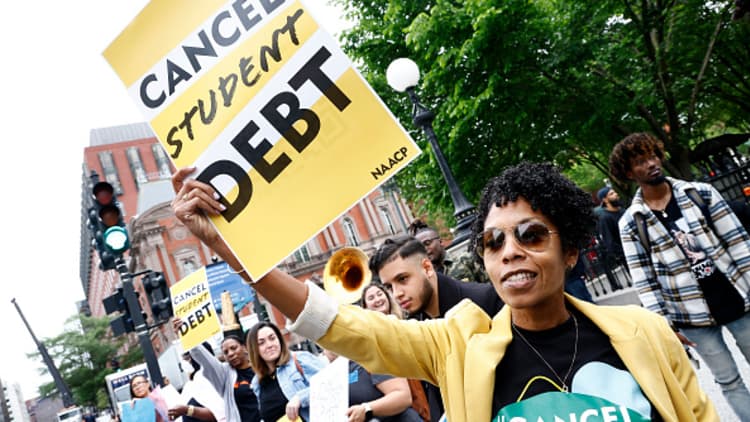The Biden administration’s student loan forgiveness plan lifted a weight off of many Americans’ shoulders, with some borrowers eligible to have up to $20,000 in federal student loans forgiven.
However, many people are on the fence about applying due to their state’s decision to consider the money saved from student loan forgiveness as taxable income.
North Carolina, Mississippi, and Indiana have all decided to tax student loan forgiveness, while states like Minnesota, Arkansas, West Virginia and Wisconsin remain undecided on the issue.
The rest of the states will not require additional state taxes.
Though it may be confusing, student loan forgiveness is still worth it for many borrowers, even if they’re taxed.
Taxes aren’t ‘one size fits all’
According to Jacob Channel, a senior economist at LendingTree, it all comes down to what the government defines as income.
“We all think, ‘I earn a salary or wage, so that’s my income.’ But other things do very often fall into the category of income,” Channel tells CNBC Make It. “For example, if you’re in school and get a grant, that grant money could end up counted toward your income.”
Moreover, Channel says that these taxes will likely differ from state to state.
“It will depend a lot on what the individual state tax laws look like. Because there’s a lot of variability across the country. There’s really no one size fits all answer. But in many cases, it’ll probably just be considered an additional 10 to $20,000 worth of income and taxed as such.”
The benefits outweigh the drawbacks
Despite state tax levies, Channel still recommends that borrowers apply for forgiveness.
“For the most part, the benefit you’ll get from having 10 to $20,000 worth of your student loan debt forgiven will probably outweigh the tax burden,” Channel says.
“Even if you’re taxed at a higher rate because you got extra forgiveness, that could potentially yield a lifetime’s worth of not having to worry about your student loan. You could become debt free and possibly save money in the future or use the money for other things, like a down payment on a house.”
North Carolina A&T graduate Carlos Williams, who currently has $41,000 in student loan debt, agrees.
“At the end of the day, whatever lowers my payment is what I will do,” says Williams. “It’s better than nothing.”
Potential refunds for pandemic payments
Updates to the student loan forgiveness plan also allow refunds for some people who continued to pay during the student loan repayment pause that started in March 2020.
According to the Department of Education, you can automatically receive a refund if you “successfully apply for and receive debt relief under the Administration’s debt relief plan” and “your voluntary payments during the payment pause brought your balance below the maximum debt relief amount you’re eligible to receive but did not pay off your loan in full.”
Others who made voluntary payments during the pause, including those who completely paid off their loans during that time, may still be eligible to receive a refund and should get more information from their servicer.
For North Carolina native and Virginia Tech graduate, Hanna Humphreys, a refund may not be all that helpful. Humphreys, who finished graduate school in 2019, paid off her student loans during the Covid-19 pandemic but remains undecided on applying for a refund.
“I don’t know if I feel like going through the process of applying, because if I get a refund and then have to pay taxes on it, it kind of seems null and void,” Humphreys tells CNBC Make It.
Channel also says that though the process may be more tedious, borrowers who paid off their loans during the pandemic may want to look into getting a refund.
“If you are in a position where you don’t mind maybe doing a little bit of extra paperwork, and there is a way for you to get refunded, that might be a good option. But before you do it, be sure that any money that’s refunded to you will still apply for forgiveness. You don’t want to get a refund, and then have them say your loan restarts after a certain date.”
What borrowers can do now


